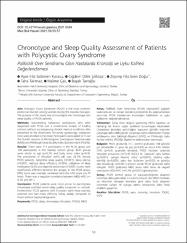Chronotype and Sleep Quality Assessment of Patients with Polycystic Ovary Syndrome

View/
Date
2021Author
Gökmen Karasu, Ayse FilizŞahbaz, Çiğdem Dilek
Eren Doğu, Zeynep Filiz
Takmaz, Taha
Çalı, Halime
Tanoğlu, Başak
Metadata
Show full item recordCitation
1. Karasu AFG, Şahbaz CD, Doğu ZFE, Takmaz T, Çalı H, Tanoğlu B. Chronotype and sleep quality assessment of patients with polycystic ovary syndrome. Haseki Tip Bulteni [Internet]. 2021;59(1):53-7.Abstract
Aim: Polycystic Ovary Syndrome (PCOS) is the most common endocrine disorder among women during the reproductive ages. The purpose of this study was to investigate the chronotype and sleep quality of PCOS patients.
Methods: Volunteering nulliparous participants who were diagnosed with PCOS and a convenience sample of healthy controls without accompanying chronic medical conditions who presented to the Bezmialem University gynecology outpatient clinic were enrolled in the study. Participants were asked to fill out the Turkish versions of Morningness Eveningness Questionnaire (MEQ) and Pittsburgh Sleep Quality index Questionnaire (PSQIQ).
Results: There were 111 participants in the PCOS group and 108 participants in the healthy control group. Both groups were similar in age (p=0.24) and body mass index (p=0.9). The prevalance of hirsutism (mFG ≥8) was 33.3% among PCOS patients. Subjective sleep quality (<0.001), sleep latency (<0.001), habitual sleep efficiency (0.003), utilization of sleep medication (0.03) and daytime dysfunction (<0.001) scores were significantly different between the groups. In the PCOS group, MEQ score was inversely correlated with the mFG score and fT levels. There was a negative correlation between MEQ-mFG (r=-
0.59, p<0.001).
Conclusion: PCOS patients were more prone to eveningness chronotype and had worse sleep quality compared to controls. Furthermore PCOS patients with hirsutism were more evening oriented and had more difficulty falling asleep compared to those without hyperandrogenism. Amaç: Polikistik Over Sendromu (PKOS) reprodüktif çağdaki kadınlarda en sık izlenen endokrin problemdir. Bu çalışmamızdaki amacımız PKOS hastalarının kronotipini belirlemek ve uyku kalitelerini değerlendirmektir. Yöntemler: Daha önce doğum yapmamış PKOS hastaları ve herhangi bir kronik sağlık problemi bulunmayan Bezmialem Üniversitesi jinekoloji polikliniğine başvuran gönüllü erişkinler çalışmaya dahil edilmişlerdir. Çalışmaya dahil edilenlerden Türkçe validasyonu olan Sabahçıl Akşamcıl (MEQ) ve Pittsburgh Uyku Kalitesi indeksi (PSQIQ) ölçeklerini doldurmaları istenmiştir.
Bulgular: PKOS grubunda 111, kontrol grubunda 108 gönüllü yer almıştır.Her iki grup da yaş (p=0,24) ve vücut kitle indeksi (VKİ) (p=0.9) açısından benzerdi. PKOS hastaları arasında hirsutizm prevalansı (mFG>8) %33,3 idi. Subjektif uyku kalitesi (p<0,001), uykuya dalama süresi (p<0,001), alışılmış uyku etkinliği (p=0,003), uyku ilacı kullanımı (p=0,03) ve gündüz işlev bozukluğu (p<0,001) anlamlı olarak PCOS grubunda daha kötüydü. PKOS grubunda MEQ skoru mFG skoru ile negatif korelasyon MEQ-mFG (r=-0,59, p<0,001) gösteriyordu.
Sonuç: PKOS kontrol grubu ile karşılaştırıldığında akşamcıl kronotipe daha yatkındılar. Hirsutizm mevcut olan PKOS hastaları ise hirsutizm olmayan hastalara göre daha fazla akşamcıl kronotipe sahipti ve uykuya dalma konusunda daha fazla problem yaşıyordu.

















